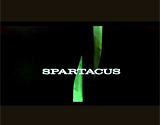
|
Spartacus (1960)
In director Stanley Kubrick's ancient 1st century
BC epic - the adventure (sword and sandal)
biopic was filmed in Super Technirama; although somewhat dated and
uneven, it was a magnificent historical costume epic. It was based on left-leaning
Howard Fast's 1951 fictionalized novel about a slave revolt in Rome
between 73-71 BC led by a gladiator. The script
had been adapted by openly-credited Communist screenwriter
Dalton Trumbo (thereby breaking the abhorrent system of black-listing). The
1991 re-release of Spartacus restored much of what had been
originally cut from the film, including adding two more minutes of
the notorious bathhouse scene.
At the time, with a budget that spiraled up to $12
million dollars, it was considered one of the most expensive Hollywood
productions at the time (the previous year's Biblical epic Ben
Hur (1959) had a budget of $15 million), and ended up with
domestic revenue of $14 million - it was the highest-grossing (domestic)
film of the year. It had six Academy Award nominations,
including Best Dramatic Score (Alex North) and Best Film Editing, with
four wins for Best Supporting Actor (Peter Ustinov), Best Color Art Direction-Set
Decoration, Best Color Cinematography, and Best Color Costume Design.
- during the opening title sequence created by design
consultant Saul Bass, the role of each of the six main cast members was illustrated by
a symbolic item:
- Spartacus (Kirk Douglas) - a manacled or chained
hand (a symbol of defiance)
- Crassus (Laurence Olivier) - an imperial or
Roman eagle (on a sceptre)
- Varinia (Jean Simmons) - a hand holding a water
or wine jug
- Gracchus (Charles Laughton) - a hand reaching
out
- Batiatus (Peter Ustinov) - a hand holding a
snake
- Julius Caesar (John Gavin) - a hand holding
a sword
- the film's title was then presented above an
image of the ends of two green sword blades
that moved vertically into the frame to challenge each other -
representative of the slaves' struggle for freedom and dignity against Rome
- the film was introduced with
a voice-over narration (by Vic Perrin) about the pagan, oppressive
and dictatorial rule of the Roman Republic before the institution
of Christianity, when a "disease called human slavery" was
rampant in society. Many were enslaved by the wealthiest Roman
class of patricians and by a class of privileged commoners known
as plebeians. Spartacus' birth signaled that he would provide the
vision to bring about the "death of slavery 2,000 years before it would finally die"
- in the year 73 BC during the
reign of the all-powerful, corrupt, stagnant and declining Roman
Republic, the title character Spartacus (Kirk Douglas) was introduced
as a life-long slave - a "proud, rebellious son" who was sold at age 13 to "living
death" working under bondage in the Libyan mining pits located in the conquered
Greek province of Thrace; he was presented as
a resistant, strong, intelligent, ferociously-angry, clench-jawed,
proud and disobedient slave who was saved from being punished to death
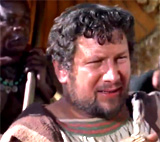
Lentulus Batiatus (Peter Ustinov) - Gladiator-School
Business Owner (lanista)
|
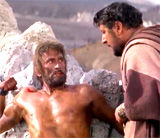
Batiatus Purchasing Spartacus For His Gladiator
School
|
- Spartacus was purchased (with others) by callous
Roman businessman-slave trader Lentulus Batiatus (Best Supporting
Actor award-winning Peter Ustinov), a gladiator-school owner (lanista)

|
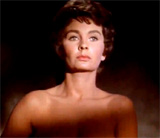
|
|
Varinia (Jean Simmons) - Slave Woman
at Gladiator School
|
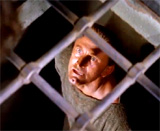
|
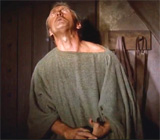
|
|
Spartacus' Protest Against His Slave-Owners: "I
am not an animal!"
|
- one evening, servant-slave women were paraded into
the quarters of the gladiators for their sexual pleasure; when
Varinia (Jean Simmons) entered Spartacus' caged cell, he refused
to mistreat or rape the demure young woman; he also rebelled and
protested being watched from above and treated
like an animal - he shouted out: "I
am not an animal"
- at the gladiator school during weeks of dehumanizing
training in the camp led by brutal head gladiatorial trainer Marcellus
(Charles McGraw), the branded slaves were
kept in cells, and during the day were mercilessly instructed and
exercised on the brutal skills of how to strategically kill to
the death in the arena - for purposes of the "sport" of
entertainment to be watched by wealthy patricians
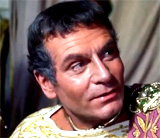
Roman Senator Marcus Licinius Crassus (Laurence
Olivier)
|
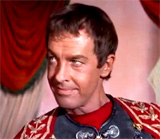
Marcus Publius Glabrus (John Dall)
|
- one day, aristocratic visitors arrived at the
Capua camp, including very rich patrician Roman Senator Marcus
Licinius Crassus (Laurence Olivier) and military commander Marcus
Publius Glabrus (John Dall), plus two "ladies" -
Crassus' wife Lady Helena Glabrus (Nina Foch) and sister-in-law
Lady Claudia Marius (Joanna Barnes), Glabrus' fiancee; Crassus
mentioned how he was in competition with an elderly, philosophical
plebian and political leader - Senator Lentulus Gracchus (Charles
Laughton) for control of the Roman Senate
- the group of visitors
suggested entertainment for their pagan amusement - "a
private showing of two pairs...to the death"
for a large sum of 25,000 sesterces;
four gladiators were selected, and in one of the pairings, Spartacus
was selected to fight against fellow Ethiopian slave Draba ("the
big black one") (Woody Strode)
- during their exciting savage duel-fight, Spartacus
was overwhelmed and disarmed, but Draba defiantly chose to spare
his life instead of lethally spearing him in the throat; Draba
ignored a thumbs-down gesture, turned and threw his
trident spear into the gallery at the visitors; as he climbed up
into the seating area to kill patrician Crassus, he was speared
in the back by an arena guard; as he fell at Crassus' feet, the
patrician cruelly slit the back of his neck with a dagger - blood
splattered onto Crassus' face
- as the patricians left the next day, Crassus had
already purchased Varinia (due to his liking her "spirit")
for 2,000 sesterces, and she was to be escorted to Rome (by Batiatus's
steward, but Batiatus ended up with the task); enraged by Varinia's
sale, Spartacus led a gladiatorial-trainee/slave revolt, and with
their advanced combat skills, the trainees were able to defeat their
captors and escape from their confines to flee into the Italian countryside
on foot and on horseback; the group set up camp on the slopes of
Mt. Vesuvius, where the "army" of slaves grew as it traversed
the countryside and went on a rampage - "looting, robbing, burning
everything" -
and freeing other slaves to join the movement
|
Important Figures in the Roman Senate
|
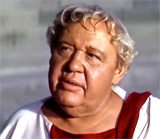
Senator Gracchus (Charles Laughton)
|
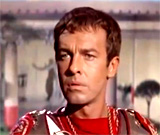
Marcus Publius Glabrus (John Dall)
|
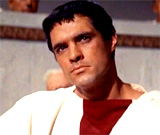
Caius Julius Caesar (John Gavin)
|
- meanwhile, in the Roman Senate, Senator Gracchus,
who realized that rival Senator and Roman General Crassus was away,
plotted to gain more power; he took the opportunity to challenge
his political rival Crassus by ordering Marcus Publius Glabrus
(John Dall), the newly-appointed head of the Roman garrison, to
lead the city's troops against the slaves; with Glabrus gone, Caius
Julius Caesar (John Gavin) would be left as the temporary chief
and commander of the remaining garrison troops in the city
- once Crassus returned, Glabrus gifted him with
a 26 year-old slave named Antoninus (Tony Curtis); Crassus was
furious that 6 cohorts of the Roman garrison led by Glabrus had
been ordered by Gracchus against the slaves on Vesuvius, and was
even more angry that Julius Caesar would command the garrison in
his absence
- Spartacus became the acknowledged chief of the fugitives,
with plans to form an army of slaves: ("We'll have a big army.
Once we're on the march, we'll free every slave in every town and
village"); while recruiting villagers in various towns in the
country-side to join their movement to threaten Rome, one of the
recruits was Varinia; she explained to an amazed Spartacus that she
had escaped while being transported to Rome by Batiatus, and she
professed her love for him
- once Batiatus arrived in Rome, he began scheming
with hedonistic Senator Gracchus; he was angry that Crassus
had single-handedly ruined and bankrupted his gladiatorial business,
and also that the independent-minded Varinia had escaped from him
- in the film's most controversial, homo-erotic bath
scene, bisexual Roman patrician Marcus Crassus was being attended
to by his recently-acquired young male slave Antoninus, and asked
him a series of increasingly-personal questions about
his gender/sexual preferences: ("Do you eat oysters?...Do
you eat snails?"); and then Crassus admitted his own bisexuality: "My
taste includes both snails and oysters"; Antoninus fled
- on the slopes of Vesuvius, Spartacus described his
strategy of allying himself with Cilician pirates; Spartacus also
accepted a new escaped slave - Antoninus, who described his special
talents: "Singer of songs...I also juggle...I can do feats
of magic." Spartacus was impressed by Antoninus' love of poetry and music; he also
spoke to Varinia about Antoninus' amazing and gifted talent to
sing, compared to his own uneducated background and his sole skill
of knowing how to fight: "Who wants to fight? An animal can
learn to fight. But to sing beautiful things and make people believe
them"; he expressed his need for an education: "I know nothing.
Nothing. I want to know - everything. Why a star falls and a bird
doesn't. Where the sun goes at night. Why the moon changes shape.
I want to know where the wind comes from...."; he also added: "I
want to know all about you. Every line, every curve. I want to know
every part of you. Every beat of your heart" - they kissed and
presumably made love afterwards - off-screen
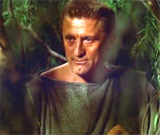
Spartacus: "I want to know - everything"
|
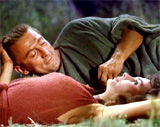
Spartacus With Varinia: "I want to know all about
you..."
|
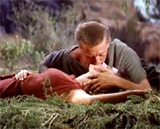
They Kissed Passionately
|
- Spartacus' goal was to take for his slave army across
one-third the length of ltaly and fight a major battle in every
town before reaching the east coast port city in about 7 months;
on the coast, the slaves would board hundreds of purchased Cilician
pirate ships to secure passage out of Italy; it was a risky strategy
- Spartacus' forces could be defeated by either Crassus or the
mighty Roman garrison dispatched and led by Glabrus
- however, Spartacus proved the might of his army
when he defeated Glabrus' campaign sent against him; Roman tents
were burned, and the soldiers were soundly destroyed, slaughtered,
and defeated (it was reported that only 14 survived), and the humiliated
Glabrus was sent back to Rome with a message from Spartacus: "Tell
them we want nothing from Rome, nothing, except our freedom! All
we want is to get out of this damn country! We're marching south
to the sea. And we'll smash every army they send against us"
- angered by Glabrus' defeat, Marcus Crassus banished the disgraced commander
from Rome, and then to curry favor for himself, Crassus then nobly
offered to step down, and accept some of the blame for Glabrus' defeat
by withdrawing from public affairs; populist leader Gracchus was
suspicious of Crassus' motives, suspecting that he wished to rule
as a dictator in Rome; he could then justify his power grab during
the crisis of Spartacus' slave revolt; Senator Gracchus recommended
appointing Julius Caesar as permanent commander of the garrison;
his second recommendation was unsuccessful - to intercept and destroy
Spartacus at the city of Metapontum
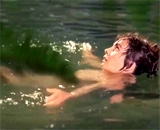
|
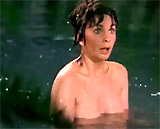
|
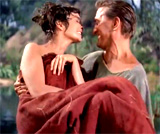
|
|
Varina's Bathing Scene - Interrupted
by Spartacus
|
- while Spartacus' forces were on the move across
southern Italy, Varinia was discovered bathing
nude in pond water by Spartacus; she surprised him by alerting
him to her pregnancy, and that she was expecting to give birth in the spring
- in competition with Gracchus, the scheming Marcus
Crassus also attempted to align himself with Julius Caesar and
have his garrison take the field against Spartacus' slave menace;
Caesar agreed there was a serious problem, but would not agree
to betray Senator Gracchus and shift his allegiances to Crassus;
without any other alternative, Gracchus offered Crassus the
commanding leadership of the legions to pursue Spartacus and restore
order, but then withdrew his offer when Crassus maneuvered for
more dictatorial power; it was soon divulged by Gracchus
that he had sought to ensure Spartacus' triumph in Italy (through
a deal with the Cicilian pirates) in order to overcome his rival
Crassus: ("We won't interfere if they transport Spartacus and
his slaves out of Italy"); he rationalized: "Politics
is a practical profession. If a criminal has what you want, you
do business with him"
- as Spartacus' forces approached the coast, he received
devastating news; due to Crassus' interference, the Cilician pirates
had been bribed to abandon Spartacus, and the Roman
armies (led by Pompey and Lucullus) had been dispatched to the
area from south and east, to force the rebels away from the coastline
toward Rome; it was all part of Crassus' plan to scare the residents
of Rome, and force his hand to obtain absolute power in the Senate;
Spartacus' only possible avenue of retreat was back to Rome - to
confront Crassus' legions
- with contrasting speeches, Spartacus delivered a
heartfelt speech to his followers, in which he announced their
predicament, and how they must now, as freedom-loving slaves, march
to Rome and confront (as free men) their rich and evil slave-holders:
("I do know that we're brothers. And I know that we're free. We march
tonight!"); meanwhile, the pompous and power-hungry Crassus had succeeded in
being appointed as Rome's all-powerful military commander to confront
Spartacus' slave army; he promised to rein in Spartacus: ("I promise
the living body of Spartacus for whatever punishment you may deem
fit. That or his head"), and shortly later on the battlefield,
he vowed to restore order to the empire: ("This
campaign is not alone to kill Spartacus. It is to kill the legend
of Spartacus")

Spartacus' Memorable Heartfelt Speech to His Followers About Their Upcoming
March To Rome: "We March Tonight!"
|
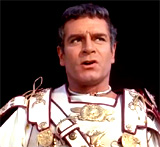
Crassus' Promise to Rome: "I promise the living body of Spartacus for whatever
punishment you may deem fit. That or his head"
|
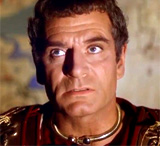
Crassus' Speech on the Battlefield: "This campaign is not alone to kill
Spartacus. It is to kill the legend of Spartacus!"
|
- before the armies met on the battlefield, Varinia
was about to give birth; Spartacus worried about the unending fighting
that they faced; he claimed he had often prayed to God for deliverance,
and for a son who would be born free - who would learn of his righteous cause
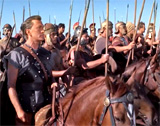
|
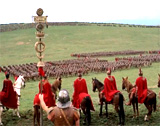
|
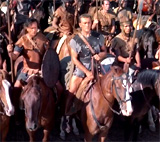
|
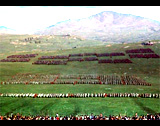
|
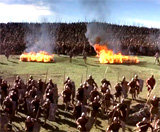
|
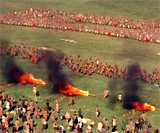
|
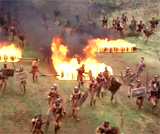
|
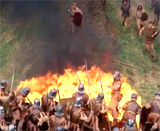
|
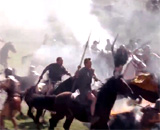
|
|
Impressive Large-Scale Battle Sequence
|
- the two mighty armies faced each other in the film's
impressive, large-scale, colossal battle scenes (requiring thousands
of extras); it was an intimidating sight as the various blocks
of legions of Roman soldiers on the immense battlefield then coalesced
into large assault lines and emerged as one strong fighting force;
Spartacus' forces fought back with large rolling fireballs and masses
of foot-soldiers, but then additional reinforcements arrived from "Lucullus
and Pompey" that doomed the rebels' chances of
victory; the slave army ended up surrounded between the three
armies assembled by Crassus - and the slave-rebels were quickly
overwhelmed and overcome
- assembled on a hillside, the captured and surviving
slaves were promised that they would be
pardoned (but returned to enslavement) and spared crucifixion if
Spartacus (either alive or dead) was identified to Crassus; Crassus'
deal for betrayal was foiled when each devoted slave - in an inspirational
scene - proclaimed: "I'm Spartacus" to save the real Spartacus
from execution by standing up and daring to be identified as such
- enraged, Crassus ordered that all of the
6,000 survivors marching back to Rome would be crucified as they
proceeded along the roadside of the 132 mile-long Appian Way between
Capua and Rome; Varinia (and her newborn child) were found on the
battlefield and ordered to be taken to Crassus' estate in Rome,
to work as his slave; and Antoninus was spotted and held separately;
Crassus also thought he spotted his likely enemy Spartacus and
also specified that he should be spared until later
- for the indignities he had suffered, Batiatus plotted
with Gracchus to rescue ("steal") Varinia from Crassus'
estate to annoy and irritate him; now with Crassus in power,
Julius Caesar had joined forces with him: "You've joined Crassus?";
Gracchus was apprehended and brought to the Senate, to be schooled
and deposed by the tyrannical Crassus, who had established a "new
order of affairs." He was ordering the arrest of those who
were "disloyal" and committing "treason"
as enemies of the state; Gracchus was to be exiled and
banished to the countryside, and forced to persuade the often troubled "mob" to
support Rome's new leadership
- the slave Varinia who was captive at Crassus' villa
was unimpressed by the commander's wealth or personal interest
in her; he desired for her to voluntarily and truly love him, as
she had loved Spartacus, but she refused
- in captivity and chained together, Antoninus and
Spartacus shared final thoughts; Spartacus gave a short heroic
statement to Antoninus after being asked: "Are you afraid
to die, Spartacus?" ("No more than I was to be born");
the two were ordered by the new dictatorial ruler to fight each
other to the death immediately, rather than the next day in the
temple in front of an audience as Julius Caesar had suggested:
"They will fight now for me. Here! And to the death. And the
victor shall be crucified. We will test this myth of slave brotherhood"
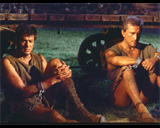
|
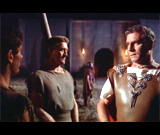
|
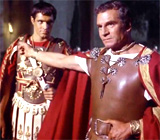
|
|
Spartacus and Antoninus Singled Out by Crassus and
Ordered to Fight to the Death
|
- during their one-on-one sword duel to the death,
Spartacus whispered orders to Antoninus to allow himself to be
killed, in order to spare him from being crucified; just before
triumphing in a mercy-killing of Antoninus by stabbing him in the
abdomen, Spartacus apologized: "Forgive
me, Antoninus." As Antoninus expired, the two exchanged loving
words: (Antoninus: "I love you, Spartacus,
as I loved my own father." Spartacus: "I love you, like
my son that I'll never see. Go to sleep"; Crassus gave orders
to the up-and-coming Caesar that the defeated victor Spartacus was
to be crucified at the gates just outside of Rome
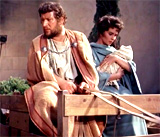
|
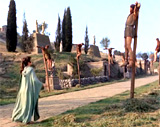
|
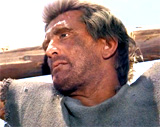
|
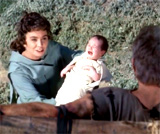
|
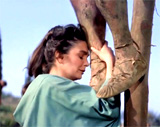
|
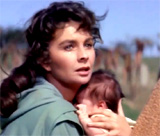
|
|
Varinia to Crucified Spartacus As She Rode Off: "Goodbye,
my love, my life."
|
- in the film's closing sequence, Batiatus
had successfully arrived at Gracchus' place with the kidnapped Varinia
and her young infant, before she was about to flee with Batiatus
from the city with a forged travel pass; on a road just outside
the Roman gates, Varinia noticed Spartacus hanging
closeby on a wooden cross; she walked up
to the foot of the cross and held up her bundled newborn son for
the crucified Spartacus to see - she assuringly declared that their
boy was free and would never forget his father: (she
assured him: "This is your son. He's free, Spartacus, free.
He's free. He's free. He'll remember you, Spartacus, because I'll
tell him. I'll tell him who his father was, and what he dreamed of");
although forced to move along, with her final tearful words of goodbye,
she held onto Spartacus' ankles and tearfully begged him to die,
before riding off in a cart with Batiatus: "Oh,
my love, my life. Please die, die. Please, please die, die my
love. Oh, God, why can't you die?...(Looking back) Goodbye, my
love, my life. Goodbye, good-bye"
|

Sample of Opening Title Sequence
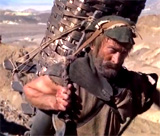
Spartacus (Kirk Douglas) - Toiling As a Life-Long Slave
in the Libyan Mine Pits
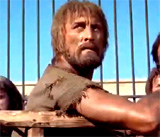
Spartacus' Arrival at Batiatus' Gladiator School
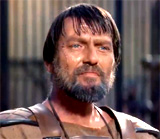
Head Gladiatorial Trainer Marcellus (Charles McGraw)
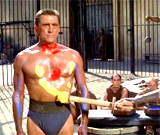
Trained in Best Methods to Kill Opponents
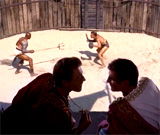
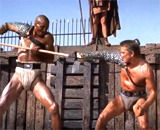
Spartacus vs. Draba in the Gladiatorial Arena - Fighting
to the Death
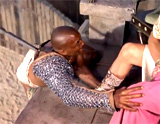
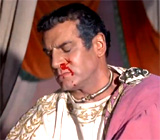
Draba's Failed Attempt to Kill Crassus in Viewing Area
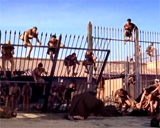
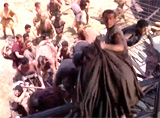
Slave Revolt and Escape, Led by Spartacus
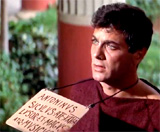
Crassus' New Slave-Servant Antoninus (Tony Curtis
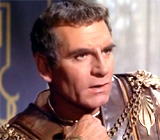
Crassus Vying to Assume Power in Rome
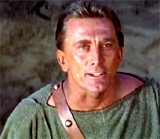
Spartacus - Leader of an Army of Freed Slaves
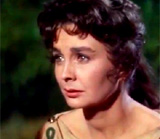
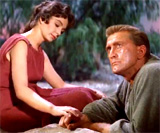
Varinia - Joining Spartacus' Forces as His Lover
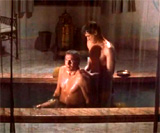
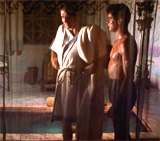
Controversial Bathhouse Scene Between Crassus (Laurence
Olivier) and Antoninus (Tony Curtis): "My taste includes both snails
and oysters"
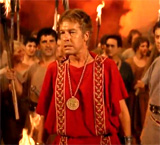
Marcus Glabrus' Roman Garrisons Defeated by Spartacus
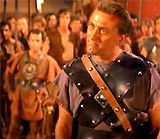
Spartacus: "We want nothing from Rome, nothing, except our freedom!"
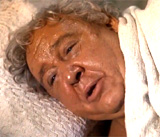
Schemers in Rome: Senator Gracchus to Julius Caesar: "Politics
is a practical profession..."
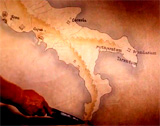
Spartacus Realizing He Was Trapped at the Coast in S. Italy, and Must
Retreat Back Toward Rome
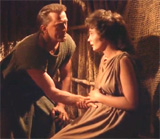
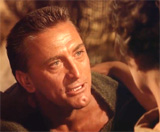
Spartacus Praying For His Son to Be Born Free
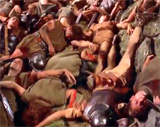
Bodies of the Thousands of Slaughtered Followers
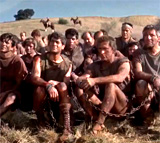
Spartacus and a Small Group of Survivors
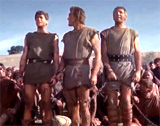
The Film's Most Famous Scene: "I'm Spartacus"
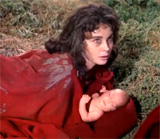
Varinia Found on the Battlefield With Her Newborn Son
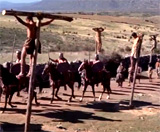
The Crucified Survivors Lined the Appian Way Back Between Capua and Rome
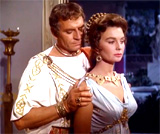
Varinia Forced to Love Crassus
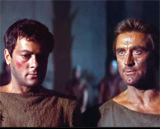
Before Duel to the Death, Antoninus Vowed to Spartacus: "I
won't let them crucify you..."
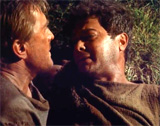
Antoninus' Dying Words to Spartacus ("I love you, Spartacus...")
|

































